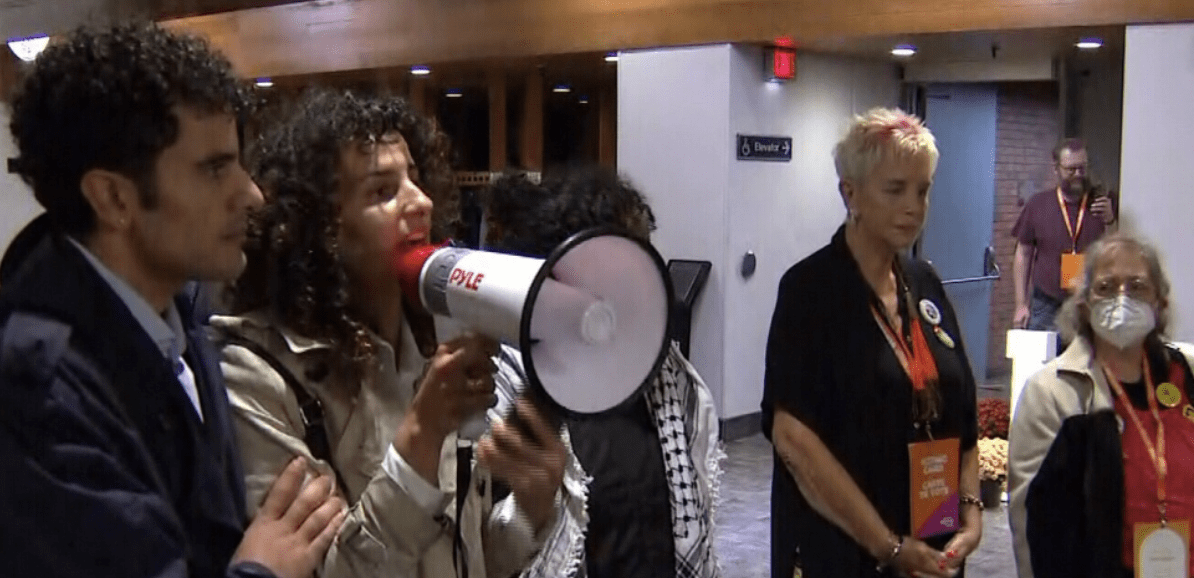This content is restricted to subscribers

The views, opinions and positions expressed by columnists and contributors are the author’s alone. They do not inherently or expressly reflect the views, opinions and/or positions of our publication.

This content is restricted to subscribers
The views, opinions and positions expressed by columnists and contributors are the author’s alone. They do not inherently or expressly reflect the views, opinions and/or positions of our publication.

In politics, there are important issues and there are useful issues. International issues and foreign affairs are important… but rarely useful, politically. No one could deny that the recent Hamas terrorist attacks, Israel’s military response, and the resulting humanitarian crisis are important things.
But watching the debate unfolding about this new crisis in the Middle East during the NDP convention, it’s hard to imagine how useful this is for New Democrats. Few voters really care about the party’s position on Palestine and Israel, and even fewer will think about it on Election Day.
Among the major parties, the NDP is the one most sympathetic to the Palestinian cause. Already in 1938, J.S. Woodsworth, first leader of the CCF, was opposed to the right of Jewish refugees to enter Palestine, claiming “it was easy for Canadians, Americans and the British to accept a Jewish colony, as long as it was elsewhere. Why ‘pick on the Arabs’ other than for ‘strategic’ and ‘imperialistic’ reasons?”
This position created a lot of turmoil within the party at the time, especially since Woodsworth, a pacifist, had been the only MP to vote against Canada’s declaration of war on Hitler’s Germany. The party would eventually line up behind the creation of Israel. But the debates were lively and accusations of racism and anti-semiticism, numerous.
Interestingly, the first Jewish politician to become leader of a party in Canada was Stephen Lewis in Ontario in 1970. His father David, became the first Jewish leader of a federal party in 1971. Another New Democrat, Dave Barrett, was elected premier of British Columbia in 1972, becoming the first Jewish premier.
This is to say that the NDP’s desire to find a balanced position on the conflict between Israel and Palestine goes back a long way. This desire for nuance has forced NDP leaders to be funambulists over time: a two-state solution; Palestine has the right to independence; Israel has the right to defend itself; denouncing terrorist actions and violations of international laws.
But this balanced position does not make all New Democrats happy. Ed Broadbent, Alexa McDonough and Jack Layton all had to manage very delicate situations. Numerous resolutions denouncing Israel are regularly brought to NDP conventions. Candidates have been rejected or dismissed because of their overly strong pro-Palestinian positions or anti-Israel statements.
Former MP Svend Robinson was once arrested by Israeli soldiers while trying to enter Ramallah, arguing that he was there to carry a message of solidarity and to promote peace.
Prime Minister Stephen Harper called for the resignation of Layton’s deputy leader, Libby Davies, for her support of the Boycott, Divestment and Sanctions movement against Israel.
On the other hand, many NDP MPs have been part of the Canada-Israel Inter-Parliamentary Group, which “furthers cooperation and mutual understanding” between Canadian parliamentarians and members of the Israeli Knesset.
Under the leadership of Tom Mulcair, some felt the party was taking a stronger position in favour of Israel. Ignoring the latter’s epic quarrels with leaders of the Jewish community, MP Sana Hassainia even slammed the party’s door using the issue as an excuse, pointing to Mulcair’s in-laws being Holocaust survivors and to the sizeable Jewish community in his constituency.
From there to say that the NDP is under the thumb of the Jewish lobby, there is only one step, happily taken by the most pugnacious. There is a mirror reaction from the fiercest supporters of Israel, who believe that the NDP is infiltrated by pro-Palestinian hysterics. In this context, having a reasonable discussion is mission impossible.
Jagmeet Singh had to play a balancing act once during this last Convention, marked by scenes of demonstrations, heckling, delegates being removed and police intervention. This is not Singh’s fault, but it gave the party an immature image, as videos of the confrontations made the rounds.
At the tactical level, these ardent pro-Palestinian activists target the NDP because it is the lowest hanging fruit. They assume the message will have a more significant and immediate impact on delegates and party policies than if they showed up at a Conservative convention.
They will claim victory when they see New Democrats stand up in Question Period, denouncing “the impact of this war on the Palestinians”, calling for a ceasefire in Gaza and asking the government to “stand up for international law”. Important questions, to be sure.
Meanwhile, Pierre Poilievre and the Conservatives are relentless on the cost of living, asking Prime Minister Trudeau to “reverse his inflationary policies,” “to lower interest rates” and to “allow Canadians to keep their homes.” Useful questions, without a doubt.
The views, opinions and positions expressed by columnists and contributors are the author’s alone. They do not inherently or expressly reflect the views, opinions and/or positions of our publication.